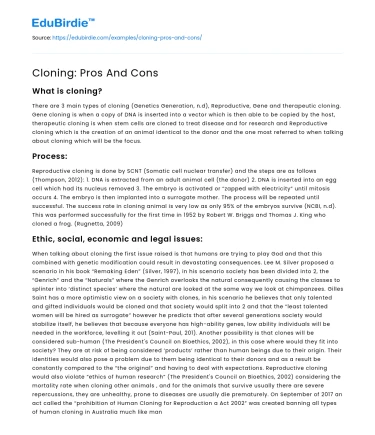What is cloning?
There are 3 main types of cloning (Genetics Generation, n.d), Reproductive, Gene and therapeutic cloning. Gene cloning is when a copy of DNA is inserted into a vector which is then able to be copied by the host, therapeutic cloning is when stem cells are cloned to treat disease and for research and Reproductive cloning which is the creation of an animal identical to the donor and the one most referred to when talking about cloning which will be the focus.
Process:
Reproductive cloning is done by SCNT (Somatic cell nuclear transfer) and the steps are as follows (Thompson, 2012):
Save your time!
We can take care of your essay
- Proper editing and formatting
- Free revision, title page, and bibliography
- Flexible prices and money-back guarantee
1. DNA is extracted from an adult animal cell (the donor)
2. DNA is inserted into an egg cell which had its nucleus removed
3. The embryo is activated or “zapped with electricity” until mitosis occurs
4. The embryo is then implanted into a surrogate mother.
The process will be repeated until successful. The success rate in cloning animal is very low as only 95% of the embryos survive (NCBI, n.d). This was performed successfully for the first time in 1952 by Robert W. Briggs and Thomas J. King who cloned a frog. (Rugnetta, 2009)
Ethic, social, economic and legal issues:
When talking about cloning the first issue raised is that humans are trying to play God and that this combined with genetic modification could result in devastating consequences. Lee M. Silver proposed a scenario in his book “Remaking Eden” (Silver, 1997), in his scenario society has been divided into 2, the “Genrich” and the “Naturals” where the Genrich overlooks the natural consequently causing the classes to splinter into ‘distinct species’ where the natural are looked at the same way we look at chimpanzees.
Gilles Saint has a more optimistic view on a society with clones, in his scenario he believes that only talented and gifted individuals would be cloned and that society would split into 2 and that the “least talented women will be hired as surrogate” however he predicts that after several generations society would stabilize itself, he believes that because everyone has high-ability genes, low ability individuals will be needed in the workforce, levelling it out (Saint-Paul, 201).
Another possibility is that clones will be considered sub-human (The President's Council on Bioethics, 2002), in this case where would they fit into society? They are at risk of being considered ‘products’ rather than human beings due to their origin. Their identities would also pose a problem due to them being identical to their donors and as a result be constantly compared to the “the original” and having to deal with expectations.
Reproductive cloning would also violate “ethics of human research” (The President's Council on Bioethics, 2002) considering the mortality rate when cloning other animals , and for the animals that survive usually there are severe repercussions, they are unhealthy, prone to diseases are usually die prematurely.
On September of 2017 an act called the “prohibition of Human Cloning for Reproduction a Act 2002” was created banning all types of human cloning in Australia much like many other countries, however the united kingdom, china and Sweden allow for the creation of clonal embryos for research (Centre for Gnetics and Society, n.d).
Pro:
- Prolong lifeStem cell could be used to regenerate cells and tissues
Organ replacement
- Gives infertile couples an opportunity to have biological children
- Replace a loved one (Savulescu, 1999)
- “Eradicate birth defects and lessen abortion” (Future of Working, n.d)Healthy cells can be cloned to replace genetic defects of an unborn child
- “social utility” (Savulescu, 1999)Clone important people such who have contributed to society
Cons:
- Violates right to individuality (Savulescu, 1999)
- Is prone to be abused (Savulescu, 1999)
- Those who have been cloned are significantly less healthy (Savulescu, 1999)Genetic malformation
Cancer
Short lifespans
- Unethical and immoral (Future of Working, n.d)Humans playing God
- Cost
- Lack of genetic variation
Currently, the cons are outweighing the pros as cloning is overall still unethical and dangerous as mentioned above and for these reasons, human cloning is illegal in most countries including Australia and the USA not allowing for this technology to be created.
Evaluation:
Cloning has clear positives, it could possibly save lives, used to cure diseases and replace organs and tissues, it also brings the possibility of getting back loved one who has passed away, however, I believe that the possible consequences to cloning are still overpowering the positives.
Cloning could completely change the way society functions and it might not be for the best as Lee M. Silver highlighted, the possibility of humans born by natural means being overlooked is definitely one of the scariest things, however considering the other argument that clones might not be considered humans and seen as “products” also seems extremely unfair. We are unsure of where clones would fit into society, their still humans just not original ones so where does that place them? Nature versus nurture also plays a role, would the clone act or think the same as their donor and be able to live up to expectations or would their similarities only go as far as their genetic makeup?
Conclusion
In my opinion whether its human or other animals being cloned its unethical both to the original and to the clone themselves, it takes away the right to individually and freedom, and places both individuals at risk., In the case of an animal going extinct I believe that careful consideration should be taken and only animals that have gone extinct due to human intervention should be cloned; however it should be used as a last resource due to the health risks.






 Stuck on your essay?
Stuck on your essay?

